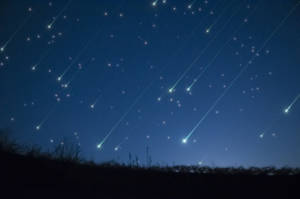
Meteor showers have many scientific and astrological impacts on Earth and its inhabitants beyond putting on a show in the night sky.
If you’re an astrology buff, you likely follow horoscopes with close interest. You comprehend planetary transits, and retrogrades are no longer a mystery. But when astrologers mention meteor showers, you may draw a blank. What do these streaking balls of dust and light mean? Understanding their scientific astrological impacts requires a little bit of background knowledge.
The Science of Meteor Showers
Space.com describes meteor showers as remnants of broken comets or asteroids traveling through our atmosphere at high speeds. During their atmospheric entry, air friction heats up and illuminates this debris. These objects can achieve average speeds of around 30,000 miles per house and temperatures of about 3,000 degrees Fahrenheit.
Meteor showers are named after the constellations in which they’re visible. The American Meteor Society lists several regular showers, including some within zodiac constellations such as Taurus, Gemini, Leo, Capricorn, and Aquarius. Most are visible at night, but one shower, the Arietids, can only be seen during daylight hours. The Perseids are some of the most popular and brightest showers, active during July and August each year.
Showers’ recurrence and visibility result from both their parental bodies’ and Earth’s orbits. That’s because our planet must be close enough to the comet or asteroid for its debris to enter our atmosphere. The Leonids are a yearly shower, for instance, but they’re the brightest when their parent body Comet Tempel–Tuttle is on its closest approach to our sun every 33 years.
Meteor Showers in Ancient Times
Scientists theorize that a comet or large meteor may have crashed about 66 million years ago, contributing to a mass extinction that killed dinosaurs and around 75% of other life on Earth. We still see possible evidence today: a 93-mile-wide crater on the Yucatan Peninsula’s northern coast.
Typical meteor showers don’t leave such earth-shaking impacts. However, historian Eve MacDonald explains that our ancestors regarded them as omens of either great promise or impending doom. In ancient times, humans referred to many celestial objects as “stars” regardless of their actual makeup. Because some meteors trailed brilliant streaks across the sky, people eventually called them “shooting stars.”
Some comets and meteor showers were thought to herald royal births or deaths. Roman historian Gaius Suetonius Tranquillus claimed that a comet was observed after Julius Caesar’s assassination in the spring of 44 BCE. Experts propose that if this “Caesar’s Comet” truly existed, it was traveling through our solar system on a parabolic escape orbit. In other words, it made a one-time-only trip past Earth and likely won’t return.
What Do Meteor Showers Mean Today?
While modern astrologers don’t regard comets and meteor showers as bad omens, they can assign a variety of meanings to these celestial events. To comprehend their interpretive approach, consider the nature of meteor showers. They’re always trailing their parent bodies, but we don’t always see them. Well+Good’s Allie Flinn quotes astrologer Rachel Lang, who says they may signal hidden or repressed things that must resurface: emotions, spiritual insights, or unforeseen changes.
Showers can also take on different meanings depending on the constellation in which they occur and who’s doing the interpretation. Since Leonid showers appear in Leo, they could indicate new shifts in a few key areas of life: the arts, theatre, creative expression, wealth, or even seats of power. Their magnitude of visible brightness from Earth can amplify these effects.
Astrology’s Keys: Symbolism and Interpretation
Meteor showers can have a significant effect on our planet, and ancient cultures once viewed them as major portents. Today, their physical impacts are mostly limited to curious spectators viewing meteor showers in our night skies. While they no longer necessarily signal bad news in an astrological sense, they can indicate significant cultural or individual developments affecting our lives.


